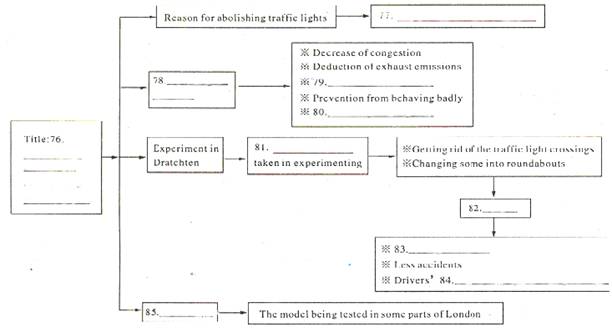题目内容
There are three separate sources of danger in supplying energy by nuclear power.
First, the radioactive material must travel from its form of production to the power station. Although the power stations themselves are strongly built, the containers used for the transport of the materials are not. Normally, only two methods of transport are in use, namely road or rail. Unfortunately, both of these may have an effect on the general public, since they are sure to pass near, or even though, heavily populated areas.
Secondly, there is the problem of waste. All nuclear power stations produce waste that in most cases will remain radioactive for thousands of years. It is impossible to make these waste radioactive, and so they must be stored in one of the inconvenient ways that scientists have invented. For example, they may be buried under the ground, or dropped into deserted mines, or sunk in the sea. However, these methods do not solve the problem, since an earthquake could easily break the containers.
Third, there may occur the danger of a leak or an explosion at the power station. As with the other two dangers, this is not very likely, so it does not provide a serious objection to the nuclear program. However, it can happen.
Separately, these three types of dangers are not a great cause for worry. Taken together, though, the probability of disaster is extremely high
- 1.
Which of the following is FALSE ?
- A.It is possible that a leak or an explosion occurs at a power station
- B.It is unusual for radioactive materials to be transported across land
- C.The containers are likely to be broken by an earthquake
- D.Nuclear wastes remain dangerous in most cases for many years
- A.
- 2.
The author thinks that the ways to store nuclear wastes are ____________
- A.easy
- B.impossible
- C.reasonable
- D.ineffective
- A.
- 3.
What do we learn from the last paragraph ?
- A.The power station is a safe place
- B.The dangers of nuclear energy can be prepared
- C.The general public are strongly against the nuclear program
- D.Itself, none of the three dangers is very likely to cause much worry
- A.
- 4.
What is this passage mainly about ?
- A.uses of nuclear power
- B.Dangers from nuclear power
- C.Public anger at nuclear power
- D.Accidents caused by nuclear power
- A.
BDDB
试题分析:
1.B 细节题。根据第一段Normally, only two methods of transport are in use, namely road or rail. Unfortunately, both of these may have an effect on the general public, since they are sure to pass near, or even though, heavily populated areas.说明核材料被运输是很正常的事情,故B正确。
2.D 推理题。根据文章第2,3,4段since they are sure to pass near, or even though, heavily populated areas.和However, these methods do not solve the problem, since an earthquake could easily break the containers.以及so it does not provide a serious objection to the nuclear program. However, it can happen.说明这三种方法都有很多的危险性,并不是十分的有效。故D正确、
3.D 推理题。根据本段Separately, these three types of dangers are not a great cause for worry. Taken together, though, the probability of disaster is extremely high.如果把这三种危险合在一起,那么就很危险了,也就是说核材料本身就是十分危险的。故D正确。
4.B 主旨大意题。文章主要讲述了核材料的危险性。故B正确。
考点:考查科普类短文阅读
点评:文章主要讲述了核材料的危险性,文章内容较为简单。考查的推理题较多,要求考生准确定位,合理推测。
试题分析:
1.B 细节题。根据第一段Normally, only two methods of transport are in use, namely road or rail. Unfortunately, both of these may have an effect on the general public, since they are sure to pass near, or even though, heavily populated areas.说明核材料被运输是很正常的事情,故B正确。
2.D 推理题。根据文章第2,3,4段since they are sure to pass near, or even though, heavily populated areas.和However, these methods do not solve the problem, since an earthquake could easily break the containers.以及so it does not provide a serious objection to the nuclear program. However, it can happen.说明这三种方法都有很多的危险性,并不是十分的有效。故D正确、
3.D 推理题。根据本段Separately, these three types of dangers are not a great cause for worry. Taken together, though, the probability of disaster is extremely high.如果把这三种危险合在一起,那么就很危险了,也就是说核材料本身就是十分危险的。故D正确。
4.B 主旨大意题。文章主要讲述了核材料的危险性。故B正确。
考点:考查科普类短文阅读
点评:文章主要讲述了核材料的危险性,文章内容较为简单。考查的推理题较多,要求考生准确定位,合理推测。

练习册系列答案
相关题目
